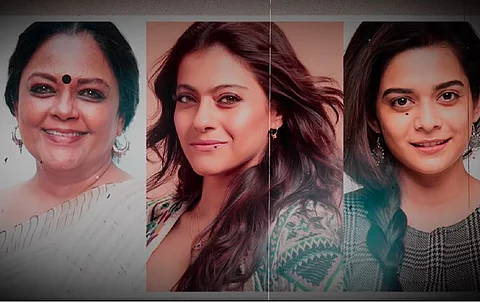

It’s a refrain as old as time. As children, many of us think that we are going to do things differently from our parents when it is our turn, only to have our parents tell us that we’ll never understand till we have children of our own. And when the unprecedented challenges of parenthood present themselves, it becomes easier to understand why. Tribhanga, a drama that unfolds across the lives of three generations of women, traverses choppy waters, attempts to showcase the effects of trauma, difficult choices, social prejudice and messy reconciliations in a 95-minute runtime. While underwhelming in parts, the Kajol, Mithila Palkar and Tanvi Azmi starrer is an ode to motherhood and unapologetic women.
The Netflix film directed by Renuka Shahane marks the OTT debut of Bollywood actor Kajol, who is seen in a no holds barred, foul-mouthed and fiery avatar that initially seems hard to digest, especially to fans of her bubbly Bollywood roles. However, Kajol’s Anuradha Apte, a renowned Odissi dancer and actor, has her moments. In many ways, it appears that she never quite outgrew the angry teenager she was compelled to become because of the abuse she faced right under the nose of her mother – Tanvi Azmi’s ambitious writer, Nayantara ‘Nayan’ Apte. But Anuradha – Anu’s – daughter, Masha, played by Mithila, seems the most different from her aayi (mother) and ajji (grandmother). She is much calmer in her demeanour, married to a man from a seemingly orthodox and regressive family.
A life-changing event – Nayan suffers a brain stroke and slips into a coma – brings the three generations together. While Anu and her brother Rabindro (played by Vaibhav Tatwawaadi) are estranged from Nayan, they are now confronted with a comatose Nayan’s wish to document her children’s stories of her in her autobiography which is being documented by an awkward, pure Hindi-speaking Milan (Kunaal Roy Kapur), whose adoration of Nayan borders on worship. Much of the story unravels in flashback, while the characters sit in Nayan’s private room, being documented by Milan – who seems to know a lot more about his muse’s life than even her blood relatives – and his camera.
What unfolds gives us a glimpse into what happens when women make difficult, unconventional choices. For one, while Nayan becomes a single mother when she leaves her marital home finding her partner's support lacking, as a viewer you want to give her props for taking that difficult step. However, when her children face bullying at school for coming from a seemingly ‘broken’ family, it becomes amply clear that empowerment and independence for women often come with a price because it is not the social norm.
Anu’s choices of not choosing monogamy and marriage seem to stem from her experiences with abuse in her own home. Her protectiveness towards Masha while respecting her choices initially show that she has broken the cycle of her mother’s mistakes, but this turns out to not be the case. Masha’s experience as a child is eerily similar to Anu’s, where she again faces the consequences of a society that taunts her as an ‘illegitimate’ child, all under Anu’s nose. Hence, her choice to marry into a household is the opposite of hers, even if it is regressive, to have a ‘normal’, socially acceptable family.
As a woman watching the film, it becomes amply clear that women’s lives would be so much easier if there wasn’t such oppressive and overwhelming prejudice against those who make their own decisions. In Tribhanga, the women have clearly made lives of their liking for themselves, and despite their differences, have supported each other. But the intergenerational trauma that follows them is deeply patriarchal, manifesting in different ways across decades.
Despite their differences, the women respect each other’s choices, whether it is to write, to act, reject marriage, or choose partners of their liking. Appreciable is Renuka’s direction that sees the women not seeing their children as just extensions of themselves but as individuals as very normal. She does treat the women’s storylines, choices or their consequences with an overt sentimentality, but leaves it to the viewer to make up their mind. The lack of judgment and the absence of glorification of these women being flawed, imperfect mothers is quite refreshing. The story treats them as individuals, without taking away the nuances that their gender adds to their lives.
While Tribhanga deserves praise for showcasing multidimensional women characters and the ways that they can support each other, there are moments when the film falters. Some moments that are meant to be about catharsis and change of heart feel underwhelming and fleeting – such as when Anu finally sees her mother apologise and express regret on Milan’s camera recordings for the abuse she failed to stop. In terms of performances, the promising Mithila role is the smallest of the lot, while Nayan (whose younger version is played by Shweta Mehendale) and Kajol take up most of the screen space. Tanvi’s scenes add gravitas and maturity to the film, which balances to an extent a brash and prone to outburst Kajol.
Tribhanga also shows the effects of abuse, its inter-generational trauma, but it does not attempt tie it up together neatly with a bow, rather, keeps it closer to reality in an ending that is fairly satisfying. It shows that reconciliation is often incomplete, messy, and sometimes, a little too late, and that is okay.
Disclaimer: This review was not paid for or commissioned by anyone associated with the series/film. TNM Editorial is independent of any business relationship the organisation may have with producers or any other members of its cast or crew.